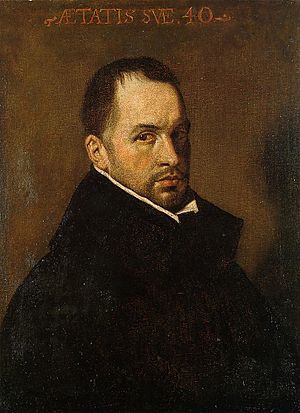Francisco de Rioja facts for kids
Francisco de Rioja was an important Spanish poet. He was born in Seville, Spain, in 1583 and died in Madrid in 1659. Besides being a poet, Rioja was also a church official at Seville Cathedral. He was also a member of the Spanish Inquisition, which was a powerful church court that made sure people followed religious rules.
Contents
Who Was Francisco de Rioja?
Francisco de Rioja lived during a time when Spain was a very powerful country. He was known for his writing and his role in the church. His life spanned much of the 17th century, a period of great artistic and literary growth in Spain.
His Role in the Church
As a canon of Seville Cathedral, Rioja held an important position within the church. This role meant he was a respected member of the clergy. His involvement with the Spanish Inquisition showed his dedication to the religious beliefs of his time.
What Kind of Poems Did He Write?
Many people consider Francisco de Rioja's poems to be some of the first examples of "descriptive poetry" in the Castilian language (which is Spanish). Descriptive poetry focuses on describing things in detail. His writing style was unique and his ideas were expressed beautifully.
Famous Works and Their Importance
Experts like Menéndez y Pelayo have praised Rioja's work. They believe his "Ode to Summer" and other poems like "To Tranquillity," "To Constancy," "To Riches," and "To Poverty" are among the best "moral odes" in Spanish poetry. Moral odes are poems that teach a lesson or share deep thoughts about life.
One of his poems, "Pura, encendida rosa" (which means "Pure, burning rose"), was translated into English. Jeremiah Holmes Wiffen translated it in 1823, calling it "The Rose."
Poems Sometimes Mistaken for His
Some poems were once thought to be written by Rioja, but later it was discovered they were by other poets. For example, the ode "A las ruinas de Italia" (To the Ruins of Italy) was actually written by Rodrigo Caro. Also, the "Epístola moral" (Moral Epistle) was likely written by Francisco de Andrada.
See also
- In Spanish: Francisco de Rioja para niños

 | Anna J. Cooper |
 | Mary McLeod Bethune |
 | Lillie Mae Bradford |


